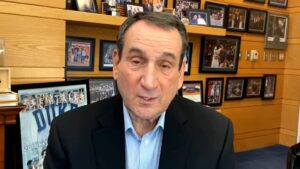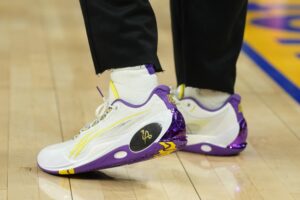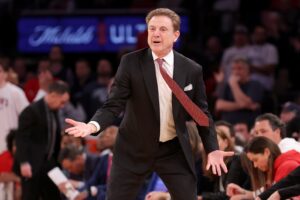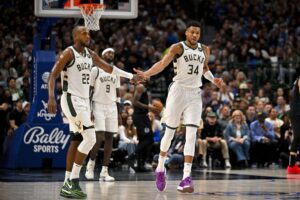Mistakes happen. We sleep in a little too late or we forget to do a project. But for us, mistakes are simply, just that – mistakes. For the thirty NBA teams, mistakes cost them, potentially, tens of millions of dollars, a playoff appearance or even a championship. They have been riddled throughout history. It can be draft picks (Blazers fans know what this is like), it can be free agency (can I get an amen from Knicks fans?), or it can be virtually anything else (in the case of the Kings, EVERYTHING ELSE).
In this article, we discuss the Utah Jazz biggest mistake in the past ten years.
The Utah Jazz Biggest Mistake in the Past Ten Years
Fans in Utah have been blessed by great basketball for the better part of the past 30 years. After 18 seasons of watching John Stockton and Karl Malone execute the pick-and-roll to perfection, the Jazz made a near seamless transition into a new era under tenured coach Jerry Sloan. After acquiring power forward Carlos Boozer via free agency in 2004, Utah drafted point guard Deron Williams in 2005 to form a new era of high-low Jazz basketball.
Background to the Mistake
From 2005 to 2010, the Jazz remained competitive in the Western Conference, becoming the chief rival of the Los Angeles Lakers come playoff time. Williams averaged 17.5 points per game, while dishing out 9.2 assists per contest during this stretch. Just as importantly, Boozer contributed 18.6 points per game, while grabbing 10.2 rebounds per contest during his tenure in Utah. Under the expert guidance of Sloan, the Jazz posted an impressive regular season win-loss record of 247-163 during the trio’s five-year run together. As is true with relationships (and fine wines), all good things come to an end, and the sky came falling down on the Jazz during the 2010-11 off-season.
The End of an Era
The beginning of the end came when Carlos Boozer signed a free agent offer with the Chicago Bulls in 2010-11. While the Jazz were equipped with Paul Millsap waiting in the wings, this moment signaled the end of Utah’s dynamic on-court duo. Amid personal trauma and a tenuous relationship with Deron Williams, Jerry Sloan resigned as head coach only 54 games into the 2010-11 season. The final nail in the coffin came two weeks later, when Utah traded Williams to the New Jersey Nets in exchange for Devin Harris and Derrick Favors.
In theory, Harris and Favors were going to replace the production of Williams and Boozer on the court. However, the Jazz quickly learned that replacing near double-double production from perennial all-stars is easier said than done. This transition did not work out as fluidly as planned, leading the Jazz to miss the playoffs and prepare next for the 2011 NBA Draft.
Lead-up to the Mistake
After nearly 25 years of high quality basketball, the Jazz entered the draft facing an uncertain future. Holding the third and 12th overall picks in the draft, Utah had an opportunity to bolster its roster and work toward replacing the talent lost in the previous twelve months. In hindsight, the choices the Jazz made on draft day in 2011 were their worst mistake of the past decade.
The Mistake
With the 3rd pick in the 2011 NBA Draft, Utah selected Enes Kanter out of the University of Kentucky. Blessed with a big body, long wingspan, and quality footwork, the big man was expected to step in and assume the role vacated when Boozer departed. The young forward failed to meet these lofty expectations, under-performing to the tune of 5.9 points and 4.3 rebounds per contest in his first two seasons. Inept at passing the ball out of the post, he posted a paltry 0.25 assists per game during this time. Kanter went on to become a quality player in the Oklahoma City Thunder, though he never caught traction in Utah before being traded during the 2014-15 campaign.
Jazz fans buzzed about the potential of Alec Burks, who was selected with the 12th pick in the draft. Following a solid career at the University of Colorado, the athletic guard was expected to be an aggressive scorer who could attack the rim at will for the Jazz. However, through five seasons in Utah, he has contributed just 10.6 points, 2.9 rebounds, and 1.9 assists per game. The Jazz have never seen the player development that they anticipated from Burks on draft night.
The Alternatives
In what turned out to be a draft that produced quality talent, the Jazz missed out on the following players at the forward positions: Tristan Thompson (picked no. 4 overall), Jonas Valanciunas (5), Kawhi Leonard (15), Kenneth Faried (22), Jimmy Butler (30), and Chandler Parsons (38). In addition to the forwards mentioned, Utah also missed out on the following guards who could have produced immediately: Kemba Walker (9), Klay Thompson (11), Reggie Jackson (24), and Isaiah Thomas (60). Utah left a lot of talent available to the rest of the league, without staking claim to any long term solutions at positions of need.
The Consequences
The combination of assets lost within 12 months, along with what transpired during the 2011 NBA Draft, make these draft day decisions the biggest mistake that the Jazz have made in the past ten years. While Utah has taken steps to rebuild its once proud franchise, returning it to relevance, the 2011 draft made that rebuilding process longer than necessary. It set the franchise back a few years in development, perhaps costing the team a chance to re-sign Paul Millsap in the process.
Do you love the Denver Nuggets, and love to write? If so, I am looking for you! LWOPB is searching for talented writers passionate about keeping the conversation going. If you think you’ve got what it takes, check out our Write For Us section and contact me at: [email protected].
Main photo:






